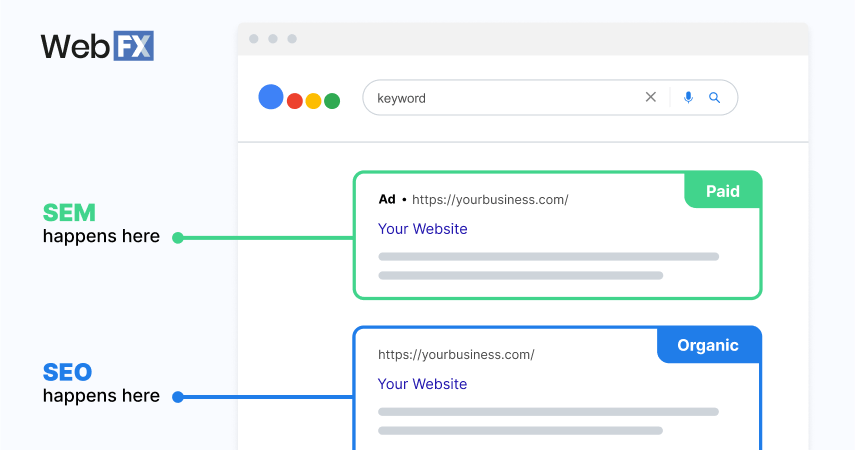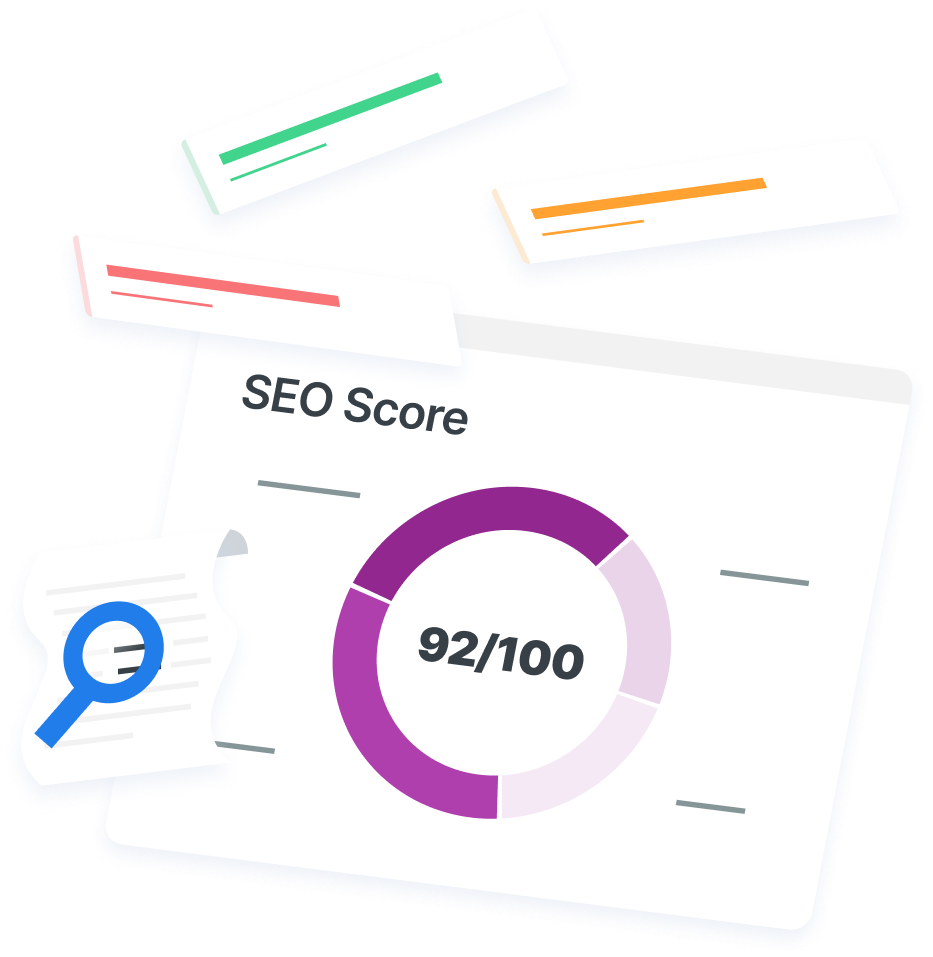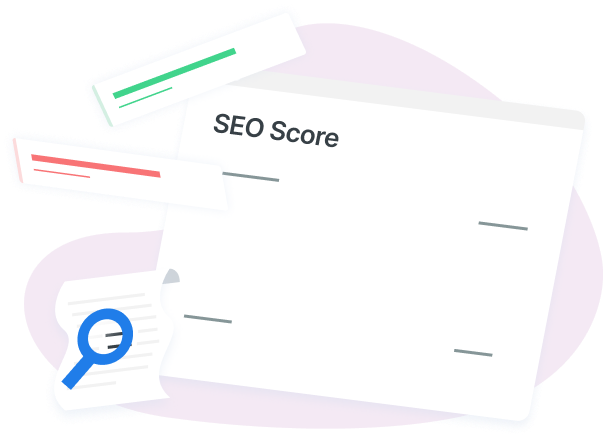-
 Published: Apr 17, 2023
Published: Apr 17, 2023
-
 8 min. read
8 min. read
-
 Trevin Shirey
Trevin Shirey VP of Marketing
VP of Marketing
- Trevin serves as the VP of Marketing at WebFX. He has worked on over 450 marketing campaigns and has been building websites for over 25 years. His work has been featured by Search Engine Land, USA Today, Fast Company and Inc.
SEO vs SEM
SEO, or search engine optimization, focuses on improving organic search rankings, while SEM, or search engine marketing, encompasses paid advertising to increase visibility on search engine results pages.
The difference between search engine optimization (SEO) and search engine marketing (SEM) is that SEO is a strategy that focuses on improving your website to rank better in the search results while SEM focuses on using both organic and paid search strategies to obtain more traffic and higher rankings.
Want to learn more about the differences between SEO vs. SEM? We’re comparing the ins and outs of both strategies in this blog post, so keep reading!
P.S. Curious about your website’s search engine performance? Use our free SEO Checker tool to get your free SEO score and audit complete with tips and optimizations to improve your site’s SEO performance!
[Table] SEO vs. SEM comparison
Get a complete summary of SEO vs. SEM in this table:
| Factor | SEO | SEM |
|---|---|---|
| Traffic Cost | Free | Typically paid |
| Marketing Type | Inbound | Outbound and Inbound |
| Time To Results | Long term | Short and long term |
| Included Channels | SEO | PPC, SEO, Display, Local & more |
| Targeting | No | Yes |
What is the difference between SEO and SEM?
The main difference between SEO and SEM is that SEO focuses on optimizing your website for higher rankings and traffic in organic search results. While SEM focuses on organic and paid search optimizations and strategies for earning those higher rankings and visibility.
To understand this key difference, it’s important to note that Google’s search results are comprised of two main categories — the organic search results and the paid search results.

The goal of SEO is to get your website to rank higher in the organic search results. Organic search results are the websites that appear below the sponsored websites. In other words, you don’t need to pay to rank in the organic results.
The goal of SEM is to get your website to rank in both organic and paid search results. Paid search results are the first three websites that appear when you conduct a search, identified by the “sponsored” tag above the page title.
Paid search is also referred to as pay-per-click (PPC) advertising. So, SEM is basically a broad term that includes SEO and PPC, which means that SEO falls under the umbrella of SEM.
SEO vs. SEM: Overview and main features
SEO
SEO is a digital marketing strategy that involves continually optimizing your website for higher rankings in the organic, non-paid search results.
SEO involves a ton of different activities to improve your search engine optimization — both on your site and around the web. These activities typically fall into two categories:
- On-page SEO:On-page SEO refers to optimization efforts that happen on your website, like updating a title tag, publishing a new blog post, or improving page speed. You have complete control when it comes to on-page SEO.
- Off-page SEO:Off-page SEO refers to optimization efforts that happen off your website, like conducting outreach, optimizing social media profiles, or sharing content. You have some control when it comes to off-page SEO, but not a lot.
- Technical SEO: Technical SEO refers to optimizations that help Google and other search engines crawl and index your website. It can include things like improving your page speed or internal linking.
A few key SEO action items typically include:
- Optimizing page titles and meta descriptions
- Keyword research and analysis
- Site and server optimization
- Content creation and optimization
With these practices — and others we haven’t listed — you tell search engine users exactly what to expect from your page and then deliver with your body text, multimedia, and other site elements. This shows your visitors that your business is savvy and in-tune with the needs of your customer base.
SEM
SEM is a general term that includes SEO and a variety of paid advertising strategies conducted within search engines.
Five popular SEM strategies include:
Like SEO, SEM operates on several different tactics, including:
- Account structure:Your account structure, which moves from account to campaign to ad group to ad, helps your business organize your ad strategy and optimize your ad spend. For example, ads about women’s sneakers should (generally) occupy the same ad campaign.
- Bids:Your bid determines how much your company will pay (at most) for a click on your ad. Some platforms, like Google Ads, offer automated bidding options that can help your business accomplish its unique goals while still staying within your ad budget.
- Quality Score:Your Quality Score, which is a measurement specific to Google Ads, represents the quality and relevancy of your ad. A high Quality Score translates to a lower cost-per-click (CPC), as well as better ad placements.
- Ad assets:Your ad assets range from your copy to your images to your video. When you optimize your ad assets, you increase your business’s chances of delivering relevant ads that improve your click-through rate (CTR).
If you plan to use SEM vs. SEO, research the different ad platforms, like Google Ads, Microsoft Advertising, and Facebook Advertising. That way, you can learn how they grade and deliver ads so you can optimize your ads for the best performance.
SEO vs. SEM: How long does it take to see results?
SEO and SEM have distinct differences when it comes to how long SEO takes and how long SEM takes:
- SEO:Around three to six months
- SEM:Instant, or as soon as your ads launch
A variety of factors can affect your turnaround time for results.
For example, your SEM campaign may not deliver results right away. Instead, you may need a few weeks of advertising data to improve your targeting to increase your conversion rates. Or, your SEO campaign may need even more time due to building backlinks or fixing issues from an SEO audit.
SEO vs. SEM: How much do they cost?
SEM and SEO can also differ depending on their costs.
In most cases, though, your average mid-sized business will invest the following into SEO and SEM:
- SEO: $750-$2000 / month
- SEM: $9000-$10,000 / month
With SEO, you don’t need to pay anything to rank in the organic search results or when someone clicks on your website. So while you won’t need to pay anything to Google or another search engine to achieve those high rankings, there are some costs you might encounter.
For example, you can experience a fee to use an SEO tool that helps you monitor your site’s performance. SEO can also take a lot of work to achieve those organic rankings, either from your own team or from an experience SEO agency, like WebFX.
With SEM, you’ll pay up-front for your paid search or PPC ads. While you’ll likely receive some quick results from PPC, it’s important to note that when you stop paying for PPC ads, your ads will disappear and your traffic will drop.
However, with SEO, once you start ranking, you’re pretty much set and don’t need to invest a lot of effort or money into maintaining those rankings.
SEO vs. SEM: Which should you use?
While SEO is the preferred choice in many cases, some situations benefit more from SEM vs. SEO.
For example, you should use SEO when:
- You can wait three to six months to start seeing traffic, leads, and online sales
- You want to use a digital marketing strategy that isn’t dependent on having a monthly ad spend
- You have the time and resources (or your SEO agency does) to manage SEO proactively
In comparison, you should use SEM when:
- You need to generate traffic, leads, or sales immediately
- You want to have a presence in high-competition search results without the wait of SEO
- You have the time, resources, and budget to manage your ads weekly
Overall, choosing between SEM and SEO depends on what you want and how fast you want it.
Is SEO or SEM right for you?

Wondering whether SEO or SEM is right for you? On this page, we’ve answered questions like “what is the difference between SEO and SEM,” “what are the benefits of SEO and SEM,” and more. But if you’re still on the fence about which strategy to use, you’re not alone.
The answer to that question depends on the goals of your marketing campaign. In a perfect world, you’d have a fantastic, high-performing SEO strategy for your website that is part of a broader SEM campaign.
You’d also have PPC campaigns targeting dozens of key demographics, hyper-focused local ads reaching people near your brick and mortar locations, and an advanced, AI-powered remarketing campaign serving personalized product recommendations to visitors coming to your site from search.
It’s possible to have a finely tuned digital marketing campaign that includes elements of SEM.
That might not be realistic for all businesses but getting started with two of the more common SEM channels like SEO and PPC is a great place to start. You can begin reaching your market through paid and unpaid channels within search and start reeling in new business and growing your company!
Independent research from Clutch has named WebFX the
top SEO company in the United States.
Clutch has personally interviewed more than 250 WebFX clients to discuss their experience partnering with us.
Read More Clutch Reviews

Get started with SEM and SEO — and make it easy — with WebFX
Not sure where to start with SEM and SEO? At WebFX, we’ve spent the past 28 years working in SEO and SEM and our search engine marketing agency would love to learn more about your business. Contact us today online or by phone, 888-601-5359, to plan your SEO or SEM campaign!
-
 Trevin serves as the VP of Marketing at WebFX. He has worked on over 450 marketing campaigns and has been building websites for over 25 years. His work has been featured by Search Engine Land, USA Today, Fast Company and Inc.
Trevin serves as the VP of Marketing at WebFX. He has worked on over 450 marketing campaigns and has been building websites for over 25 years. His work has been featured by Search Engine Land, USA Today, Fast Company and Inc. -

WebFX is a full-service marketing agency with 1,100+ client reviews and a 4.9-star rating on Clutch! Find out how our expert team and revenue-accelerating tech can drive results for you! Learn more
Try our free SEO Checker
Boost your site’s search performance with our free SEO Checker. Analyze your website for optimization tips on titles, headers, content, speed, and more. Get a free report now to enhance rankings on Google, Bing, Yahoo, and beyond!

Table of Contents
- [Table] SEO vs. SEM Comparison
- What is the Difference Between SEO and SEM?
- SEO vs. SEM: Overview and Main Features
- SEO vs. SEM: How Long Does It Take to See Results?
- SEO vs. SEM: How Much Do They Cost?
- SEO vs. SEM: Which Should You Use?
- Is SEO or SEM Right for You?
- Get Started with SEM and SEO — and Make It Easy — with WebFX


How Is Your Website’s SEO?
Use our free tool to get your score calculated in under 60 seconds.
Try our free SEO Checker
Boost your site’s search performance with our free SEO Checker. Analyze your website for optimization tips on titles, headers, content, speed, and more. Get a free report now to enhance rankings on Google, Bing, Yahoo, and beyond!






